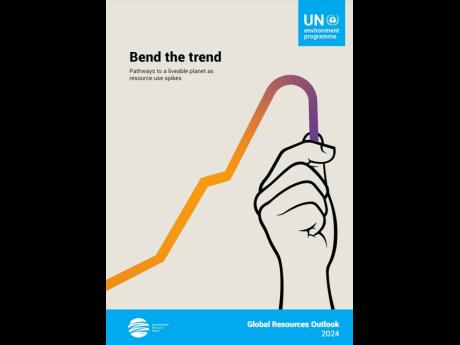Earth Today | Policy shifts a must for sustainable resource management
FROM LIFESTYLE and consumption challenges, including a lack of access to affordable and sustainable products to fragmented governance that undermines integrated responses, the challenges to sustainable resource use and management are many.
Still, the latest Global Resources Outlook report maintains that there are ways to get through to better days. Pivotal to this, it has noted, are policy shifts.
“Policy must drive change and ensure the necessary conditions for promoting the much-needed systemic change in our systems of consumption and production. This includes, inter alia, improved institutions and governance mechanisms that consider regulations, incentives and market-based instruments that can be developed inclusively and equitably on the basis of scientific evidence,” noted the 2024 report.
“Other major elements for success include alignment around common strategic goals across sectors and levels of governance, plus international coordination – for example, through financial, knowledge, technological and capacity exchange,” it added.
Titled Bend the trend: Pathways to a liveable planet as resource use spikes, the report analyses trends, impacts and distributional effects of resource use. Included in the natural resources it looks at are biomass, notably crops for food as well as wood for energy and industrial use; fossil fuels such as coal, gas and oil; metals, including iron and aluminium; non-metallic minerals such as sand and gravel; as well as land and water.
Also important to realising sustainability, it said, is the deliberate effort to be rid of unsustainable practices.
“For several decades, international organisations, scientists and civil society actors have pleaded for the phasing out of environmentally harmful taxes and subsidies, unsustainable spatial planning practices, and so on,” reads a section of the report.
Subsidise unsustainable practices
“However, much capital has been poured into property and fossil fuels, while relatively small amounts of capital have been dedicated to sustainable resource use. This applies to public finance, where it is still the norm to subsidise unsustainable practices and private finance. Indeed, fossil fuels benefited from record subsidies in 2022,” it added.
Also important, the report said, is implementing appropriate measurement for the transition towards sustainable resource use and management.
“This includes metrics that go beyond traditional measures of success – usually economic indicators, and specifically gross domestic product (GDP). Gross GDP is compiled by virtually all countries based on their system of national accounts as a summary figure for economic activity. Over time, GDP has also been used as a measure of overall well-being and welfare, despite its exclusion of environmental factors (natural capital) and many social factors (social capital),” the report explained.
“To inform and guide a sustainable transition, robust, complete, transparent and regularly updated data on the costs and benefits of resource use are also needed. This will make it possible to monitor the ability and efficiency of provisioning systems in delivering human well-being. The SDG indicator framework provides a comprehensive starting point, including indicators on the performance of the provisioning systems that provide us with food, housing, and energy, for example,” the publication added.
Provisioning systems, it explained, is a concept that “groups together ecological, technological, institutional and social elements that interact to transform natural resources to satisfy human needs”.

